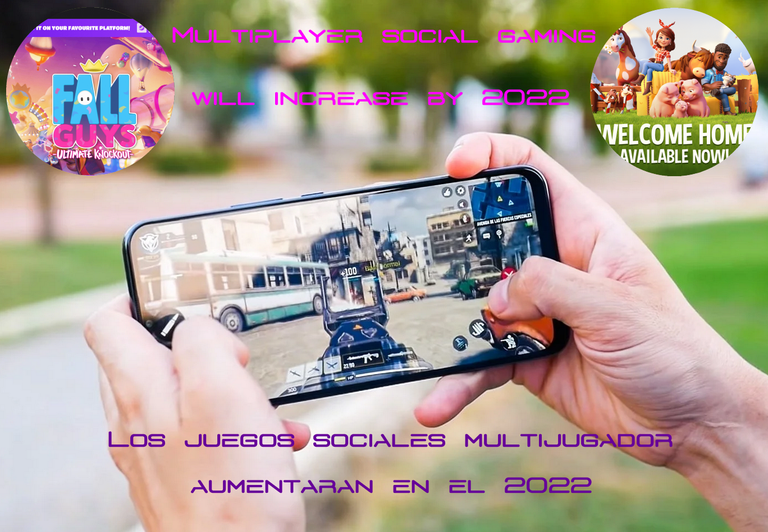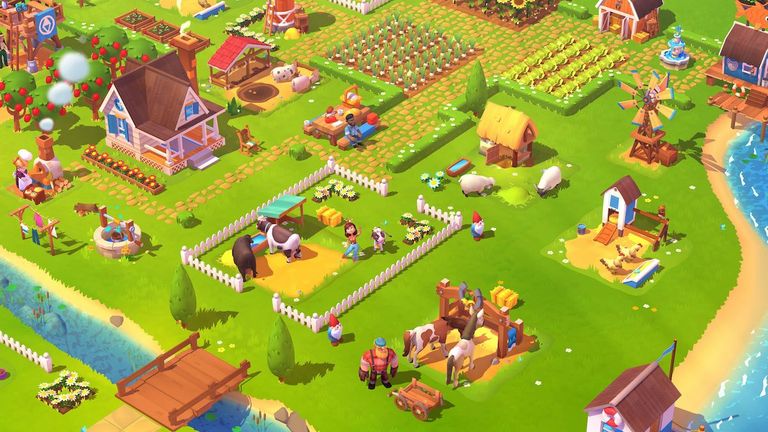
Although one should not underestimate the problem of the isolation to which they lead as a means of disengagement or complete evasion from the rest of the world, a prevailing theory in the late 1990s, one must accept the fact that video games in general - and more so in extreme cases such as the compulsory silencing due to the Covid-19 coronavirus pandemic - are a very good means of socialisation.
There are two fundamental tools that make this socialisation through video games possible. One is chat and the other is the connection through a voice channel allowing game participants to talk to each other as if they were in a real world room and not a virtual one where communication can also take place not verbally but through written messages in these chat rooms.
Multiplayer social games will increase in 2022, marking a trend that increased markedly during the Covid-19 pandemic.
With the advent of social networks and their mass dissemination, it was strange that games had not yet made a major appearance on social networks. This is what is projected for 2022.
Social networks have definitely invaded our lives and have become an element of daily consultation, research, curiosities and also - obviously - games.
With the pandemic, many gamers found a way to interact socially with other people while being confined to mandatory confinement especially during 2019, 2020 and part of 2021.
As a somewhat academic but real definition, we could say that social video games (or simply games) are those that use, as the name suggests, social networks to play online, thus sharing their achievements with people anywhere in the world.
Virtuality knows no borders and, in this way, players can involve as many friends as possible in the games.
And this is where the main difference with other games lies, since social video games involve the integration and active participation of people who are sometimes real acquaintances, sometimes virtual acquaintances, but with whom we have identified -in a certain way- to the point of considering them -friends- and benefiting them with a "like", "I follow you", etc. There is a certain compatibility of character that, in other games, is not apparent.
It is a category of games which until now has been present especially in the so-called traditional board games but which everything indicates that this year will be extended to the multiplayer and cooperative games sector.
The main characteristic that identifies this type of video games and makes them even more attractive is the real interaction between players, even though they are essentially similar to real games of chance in which you can compete with other people for a prize.
What was once used on social media to promote a certain product has now become a steadily growing video game model thanks to the popularity and success of social media in general.
Subsequently, over the years, social videogames were integrating more and more people until they "collapsed" definitively during the pandemic.
For more than a decade, social video games have been present in the networks.

Already towards the end of 2009, when gaming had not yet reached even remotely the business it represents today, some social games started to appear, such as FarmVille, Mafia Wars and Castle Age, just to mention the best known at the time.
Some projects have continued, the most visionary ones, who were not resigned to abandoning a market niche which, they believed, would have immense value in the future. And they were not wrong.
Some, such as Mafia Wars developed by the company Zynga (which abandoned the project in 2017) went on to win important prizes and awards such as the Webby Awards in the People's Voice Winner category, reaching almost 30 million monthly users at the time.
FarmVille was also a social video game, but instead of cities, the central element was a farm and the products that could be grown on it.
It was also developed by Zynga (which develops games similar to internet browsers autonomously and presents them as widget applications on various social networks) which announced on the last day of 2020 that it would discontinue FarmVille on Facebook as the social network would no longer support games that run on Flash Player, admitting - instead - that it would continue to develop games for mobiles, a market sector that will also be greatly boosted in this year 2020.
Social video games enhance the possibilities of communication in the network in which they are played.

Social video games have the particularity, unique in their genre, of integrating all the different capacities and potentialities -present and future- of communication of the social network in which they are executed and in which all the users are interacting, such as messaging through the well-known chats, sending invitations to participate, using for this purpose the contents that the users of that network have been creating.
If we add to this the technological advance of mobile devices, together with the empowerment of networks with 5G, we find ourselves with a scenario in which new elements are being added to the characteristics of sociability that these types of applications present, among which, just for illustrative purposes, we can mention geolocation, the use of cameras and/or microphones to share in real time aspects and impressions of the games and the possibility of being permanently connected through a wireless network.
Social video games on mobile phones.

Among Us is another of the most popular titles on social media with a new space setting.
Security, i.e. the protection of the integrity of the platform and fundamentally of the players' data, has been one of the reasons why it is predicted that during 2022 the boom of these video games (and others in general) on mobile devices will take place, added to the monitoring and the possibility of massifying the operating platform, which in other words means building the game so that it can work on various platforms and different social networks, something that was (almost) impossible to achieve until now on computers due to the security flaws that generally manifested themselves using flash player.
For this reason, with the adoption of the HTML5 language by companies that lead the world market such as Google, Apple and Microsoft, both desktop computers and smartphones and tablets can make use of multimedia content (and in this case we are talking specifically about video games) using any browser, without the need to install an additional plugin.
No comments:
Post a Comment